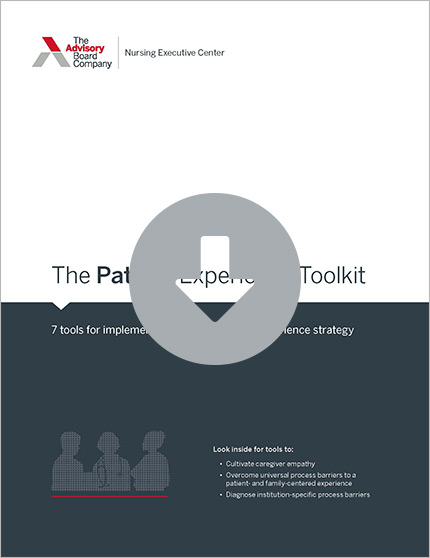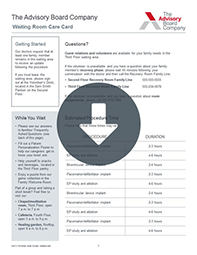Auto logout in seconds.
Continue LogoutHealth care providers should "treat families as key partners in medical care," Sushrut Jangi, a gastroenterology fellow and instructor in medicine at Brigham and Women's Hospital, writes in an opinion piece in the Boston Globe.
Ease family anxiety in the waiting room with a customizable care card
Hospital policies kept families away
Historically, Jangi writes, hospitals and physicians have kept families away from patients by restricting visiting hours. For example, he notes until the 1960s, institutions such as Johns Hopkins Hospital restricted visitations to a few hours per week—and until the 1970s, it was common practice to separate newborns from their mothers for several hours after delivery, according to Jangi.
Those policies, Jangi writes, were grounded in the belief that family interactions could exhaust patients or lead to stress or cause heart attacks. Some physicians also feared family members might bring outside infections into a patient's room or might "crowd out the medical team from attending to" the patient, Jangi says.
'We've been mostly wrong about all of this'
"Yet it turns out that we've been mostly wrong about all of this," Jangi writes.
He explains, "families and medical teams want the same thing: to make someone better .... Families don't obstruct us—they are our allies."
In fact, Jangi writes, "Patients who are critically ill have shorter stays in the intensive care unit when the family is involved" and "people who have suffered debilitating strokes gain more function back when they have familial support." He continues, "Moreover, research doesn't support the idea that relatives introduce infection." Citing recent guidelines from the Society of Hospital Epidemiology, Jangi writes that "in most cases, family members no longer have to wear hospital-issued gowns in patients' rooms."
In addition, Jangi points to recent research showing improvements in patient outcomes and a reduction in hospital errors when family members are involved in patient care. For example, one study on neonatal intensive care units showed premature infants increased breast milk feedings and experienced greater weight gain when parents were actively involved in their infants' care. Separately, a study at Boston Children's Hospital showed family members are "are five times better at picking up hospital errors than standard monitoring systems."
Jangi also shares his own observations about the benefits of family support when "caring for elderly adults who become delirious after the sun sets—a common phenomenon." But when these patients have family present, their "delirium can lift," because "familiar faces reorient the patient," he writes.
For instance, Jangi recalls a patient who "refused almost every hospital meal for the past two weeks" but "accepted a bowl of soup from his daughter's hands—keeping him from needing a feeding tube."
Jangi concludes, "Families … can … offer something that doctors really can't: comfort" (Jangi, Boston Globe, 5/1).
Minimize family anxiety with this customizable waiting room care card
It’s tough to balance provider productivity and patient-centeredness, and the waiting room is one frequently overlooked opportunity to find equilibrium. By explaining what to expect during procedures, you can neutralize a major source of family anxiety and questions.
We've made it easy. Use our template to create a "waiting room care card" that addresses key family questions. Just drop in your logo and add your institution’s protocols. Save, print, and start improving your waiting room experience.
Don't miss out on the latest Advisory Board insights
Create your free account to access 1 resource, including the latest research and webinars.
Want access without creating an account?
You have 1 free members-only resource remaining this month.
1 free members-only resources remaining
1 free members-only resources remaining
You've reached your limit of free insights
Become a member to access all of Advisory Board's resources, events, and experts
Never miss out on the latest innovative health care content tailored to you.
Benefits include:
You've reached your limit of free insights
Become a member to access all of Advisory Board's resources, events, and experts
Never miss out on the latest innovative health care content tailored to you.
Benefits include:
This content is available through your Curated Research partnership with Advisory Board. Click on ‘view this resource’ to read the full piece
Email ask@advisory.com to learn more
Click on ‘Become a Member’ to learn about the benefits of a Full-Access partnership with Advisory Board
Never miss out on the latest innovative health care content tailored to you.
Benefits Include:
This is for members only. Learn more.
Click on ‘Become a Member’ to learn about the benefits of a Full-Access partnership with Advisory Board
Never miss out on the latest innovative health care content tailored to you.


